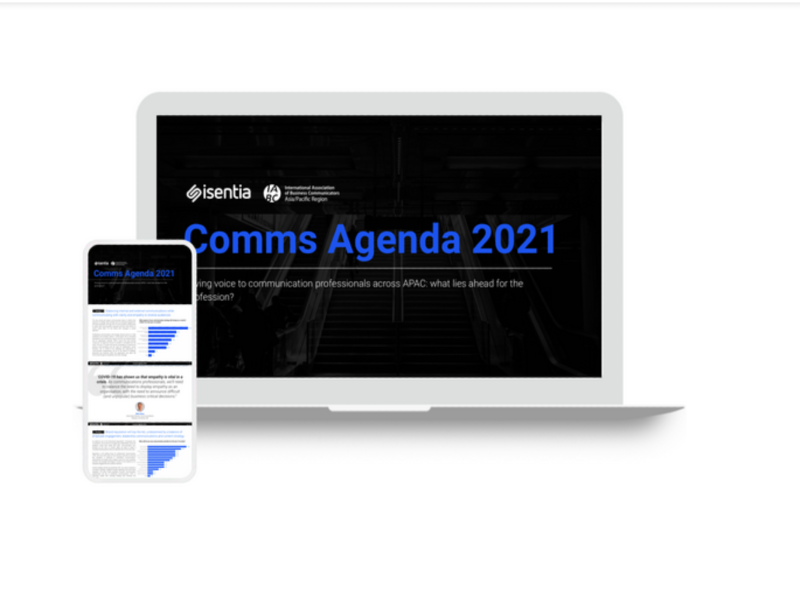PRovoke Media 29 Jul 2020 // 7:42AM GMT

SINGAPORE — Communicators over the next 12 months will have an elevated role in crafting business strategy, as businesses focus more intently on reputation and employee engagement as the result of Covid-19, according to new report from the International Association of Business Communicators APAC and Isentia.
The Comms Agenda 2021 finds 25% of APAC communication teams will be closely involved with business strategy. 14% of respondents said they plan to focus their efforts on brand reputation. Another 14% said they they plan to use technology to heighten employee engagement over the next year.
The research, which surveyed communicators across 21 industries and 14 countries (Australia, China, Hong Kong SAR, India, Indonesia, Japan, Malaysia, New Zealand, Pakistan, Philippines, Singapore, Taiwan, Thailand, Vietnam), also revealed challenges communicators face in accomplishing that.
With a greater focus on strategy, for instance, in-house teams will have to strike a balance between doing the hands-on work themselves and outsourcing it to agencies. Having to reach diverse audiences — and across multiple channels — messaging will have to be empathetic as well as exceedingly clear.
Strengthening relationships with employees, which will be an essential component of post-pandemic recovery, will amplify the importance of company culture and its impact on customer relationships and corporate reputation. Communicators also will be tasked with using data more robustly to inform their strategies — and shape their own positions, the study found.
“For many organisations, Covid-19 has, and continues to place strategic communication high on the board agenda as comms professionals are increasingly seen as trusted advisors and critical to the success of an effective response. While countries across APAC are at various stages of the journey as they navigate through the pandemic, from initial containment to the phased transition of living and working with Covid-19 to recovery, the pressing need for nimble, strategic and resilient communication remains a constant,” the report said.
Among key findings:
Strategy Will Take Centre-Stage. 24% of communication professionals surveyed stated that they plan to review their communication channels and focus their efforts on owned media, while 17% will rethink their message to market approach. Comms professionals will rethink their approach to strategy, focusing on new priorities such as employee engagement and brand reputation. The next 12 months will also see comms professionals strive to strike the right balance between internal and external communications for more effective collaboration across functions; 25% of communication professionals will work more closely with Strategy teams leading to the outsourcing of more hands-on tasks such as Design & Creative (17%), Social Media (15%), and PR (14%).
Managing And Enhancing Brand Reputation Will Be The Top Priority. When asked about the top communications priorities over the next 12 months, respondents have indicated the need for a consistent brand presence that can stand the test of time and crisis. As such, brand reputation is the leading focus for professional communicators (14%), underpinned by a mix of employee engagement (10%), leadership communications (10%) and content strategy (12%) – all of which have a direct correlation with enhancing overall corporate reputation.
Finding Consensus On The Right Data To Enable Decision-Making Will Present An Opportunity. It's clear that there is a desire for good research and data to support comms strategy, but there is little consensus on what type of data would be most effective. Measurement in a post-pandemic world will be critical. With the increasing pressure to deliver strong ROI, communication teams will rely heavily on data and measurement tools to have a holistic view of the key reporting dimensions of stakeholder surveys (15%), employee engagement (11%) and reputation analysis (9%). The Comms Agenda 2021 study reveals survey metrics as the main data point to inform communication strategies over the next 12 months.
Leveraging Technology To Strengthen Employer-Employee Relationship. Communication professionals will turn to technology to make a bigger impact on the lifeblood of their organisations over the next 12 months, with 15% wanting to focus on employees and 13% on customers. Communication teams will also adopt more tech and automation tools to enhance their brand communications (12%) and crisis management strategies (12%).
“We know that organisations are not out of the woods yet when it comes to navigating the pandemic and adapting to the different stages each city finds itself in. Over the next 12 months, communication professionals will continue playing a key role in helping with this,” said IABC APAC chair Kristy Christie. “However, to retain our seat at the table, it's important to remember Daniel Munslow's advice that ‘trusted advisors lead instead of follow.’ We must be proactive in gathering the data needed to identify risks, stay abreast of evolving trends, monitor potential pressure points and then use it to inform both our decision making process and the solutions we propose to executives.”


































.jpg)

















